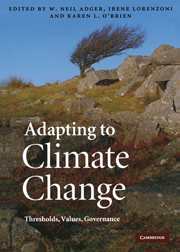Book contents
- Frontmatter
- Contents
- List of contributors
- Preface
- 1 Adaptation now
- Part I Adapting to thresholds in physical and ecological systems
- Part II The role of values and culture in adaptation
- 9 The past, the present and some possible futures of adaptation
- 10 Do values subjectively define the limits to climate change adaptation?
- 11 Conceptual and practical barriers to adaptation: vulnerability and responses to heat waves in the UK
- 12 Values and cost–benefit analysis: economic efficiency criteria in adaptation
- 13 Hidden costs and disparate uncertainties: trade-offs in approaches to climate policy
- 14 Community-based adaptation and culture in theory and practice
- 15 Exploring the invisibility of local knowledge in decision-making: the Boscastle Harbour flood disaster
- 16 Adaptation and conflict within fisheries: insights for living with climate change
- 17 Exploring cultural dimensions of adaptation to climate change
- 18 Adapting to an uncertain climate on the Great Plains: testing hypotheses on historical populations
- 19 Climate change and adaptive human migration: lessons from rural North America
- Part III Governance, knowledge and technologies for adaptation
- 31 Conclusions: Transforming the world
- Index
- References
16 - Adaptation and conflict within fisheries: insights for living with climate change
Published online by Cambridge University Press: 31 August 2009
- Frontmatter
- Contents
- List of contributors
- Preface
- 1 Adaptation now
- Part I Adapting to thresholds in physical and ecological systems
- Part II The role of values and culture in adaptation
- 9 The past, the present and some possible futures of adaptation
- 10 Do values subjectively define the limits to climate change adaptation?
- 11 Conceptual and practical barriers to adaptation: vulnerability and responses to heat waves in the UK
- 12 Values and cost–benefit analysis: economic efficiency criteria in adaptation
- 13 Hidden costs and disparate uncertainties: trade-offs in approaches to climate policy
- 14 Community-based adaptation and culture in theory and practice
- 15 Exploring the invisibility of local knowledge in decision-making: the Boscastle Harbour flood disaster
- 16 Adaptation and conflict within fisheries: insights for living with climate change
- 17 Exploring cultural dimensions of adaptation to climate change
- 18 Adapting to an uncertain climate on the Great Plains: testing hypotheses on historical populations
- 19 Climate change and adaptive human migration: lessons from rural North America
- Part III Governance, knowledge and technologies for adaptation
- 31 Conclusions: Transforming the world
- Index
- References
Summary
Introduction
Continuous over-fishing and declining fish stocks have caused many scholars to proclaim a global crisis in fisheries (Pauly et al., 1998, 2002; Worm et al., 2006; Clark, 2007). The extent and cause of this crisis are complex and heavily contested. Despite this uncertainty, there is growing consensus that the future of fisheries is severely threatened and urgent action is required if marine ecosystems are to function in the future (FAO, 2000; Pauly et al., 2002; WCSD, 2002). It is within this era of alarm that fisheries must now contend with an additional threat – that of human-induced climate change. Most research on fisheries and climate change focuses on the predicted impacts of climate change on the fish – fish ecosystems (Walther et al., 2002), fish abundance (Stenevika and Sundbya, 2007) and fish habitats (Pittock, 1999). More recently, the impact of climate change on the economic future of fisheries has received growing attention (Eide, 2008). This chapter expands on this debate through an exploration into how the fisher and fishing society is adapting (or not) to the many changes and challenges now faced.
Fishing is an inherently risky and unpredictable business. It remains one of the most dangerous of all human livelihoods (Perez-Labajos, 2008) and fishers often live with high levels of income fluctuation and uncertainty. Despite this, the ‘thrill of the hunt’ and ‘finding of fish’ has been interpreted as a valued aspect of fishing life – the adventure and challenge of fisheries playing an important role in job satisfaction (Pollnac and Poggie, 2006 p. 333).
- Type
- Chapter
- Information
- Adapting to Climate ChangeThresholds, Values, Governance, pp. 255 - 268Publisher: Cambridge University PressPrint publication year: 2009
References
- 13
- Cited by

